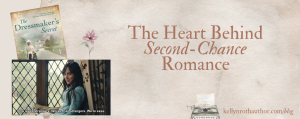
Hello my friends! Today I’m joining a blog collaboration with Grace A. Johnson and R.M. Archer. Our goal is to share about certain romance tropes. You can read Grace’s post on enemies-to-lovers here and R.M.’s post on arranged marriages.
But now I get to say my piece, and I’m talking about something I don’t believe I’ve ever talked about on my blog before: the heart behind second-chance romance.
Let’s talk about it.

The Story of Second-Chance Romance
Much like how Pride & Prejudice seems to have inspired enemies-to-lovers (see my post about that here), Jane Austen’s Persuasion seems to be the origin of second-chance romance. It’s a trope that may go further back, as with P&P. In fact, there’s some scholarly debating over whether Much Ado About Nothing is a second-chance romance (which definitely makes my favorite Shakespeare play all the more interesting).
Regardless of where this trope originated and how long it’s been around, it’s no secret that there are dozens of romances—many of them with “second-chance” slipped into the title—available on booksellers everywhere. Specifically, this seems to be a common trope in the subgenres of bully romance (gross), secret baby romances (has to be handled very carefully), and older adult romances (which is cute & we need more of because romance doesn’t disappear at 25).
There are two books that can be loosely categorized as “second-chance romance.”
- Persuasion-style, in which a character reunites with an old sweetheart and has a “second chance” at love with them.
- Books that have ANY “second” romance—so if the main character or characters experienced heartbreak in the past, some people will define it as “second chance.”
In this post, we’re specifically focusing on Persuasion-style second-chance romance where the main characters are reuniting after a separation, but we will also cover the more “finding love again” variation of this which is such a common trope that it’s become less of a trope and more of a romance staple for any slightly-older characters.
Perhaps this has become less of a trope and more of a romance staple in some areas. A lot of the stories I was able to come up with that contained some portion of this trope but not all of it. Oftentimes hints of this trope at contained within a larger overarching story rather than being the entire plot.

Examples of Second Chance Romance
Persuasion
Persuasion is the first book that comes to mind, and at first, it was the only QUALITY book that came to mind. However, notwithstanding, it is the Queen of this trope. No one has done this trope with the same seriousness, emotions, and functionality as Austen did way back in the early 1800s. Anne Elliot’s story is heart-wrenching, and we are able to see her both as a flawed person and as someone who desperately needs the love she missed out on. Further, on the reread, you see exactly what our dear captain was thinking and want all the more for them to end up together. Though this is far from my favorite Austen novel, I still appreciate the tropes as presented, and goodness, they are well done.
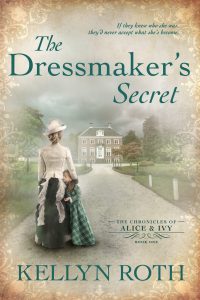 The Dressmaker’s Secret
The Dressmaker’s Secret
My own book!
Granted, I don’t hit a lot of the tropes, but at its essence, for a non-romance book, that is essentially what the story is.
The reason I think this story doesn’t really feel like a second-chance romance (other than Alice being a narrator along with Claire) is that the focus was never, “Will they find love again?” It was, “Will they create a FAMILY?”
And to me, that’s more powerful. It’s not just giving in to uncontrollable emotions. I couldn’t care less about that (even though I may squeal a little when it happens in a favorite book or movie). It’s about choosing commitment, choosing what’s right, choosing each other. And I’ll talk about that more later, but isn’t that what second-chance romance ought to be?
A few other books in my genre that contain this trope include:
- In Love’s Time and High as the Heavens by Kate Breslin
- Shadows of Swanford Abbey by Julie Klassen
- The Heart’s Charge by Karen Witemeyer
From films, I’ll point you to:
Downton Abbey (BBC drama series)
This is basically Mary and Matthew’s end-game story, and I love it. As you know if you’ve watched the show, their relationship is complicated but beautiful. It slowly draws you into the realization that they can ONLY be together, but some bad advice and both of their pride separates them when they were practically engaged (*squeals in protest*), and it continues to separate them until at last … at last!
:max_bytes(150000):strip_icc()/__opt__aboutcom__coeus__resources__content_migration__brides__public__brides-services__production__2016__10__24__580e5541382731317addc780_blogs-aisle-say-lady-mary-headband-downton-abbey-1da40302b5474cbbb108b7784454ee24.jpg) This feels like it should be too frustrating to work, but it is so well done, and further, you really believe this couple belongs together. They are simply separated by their character flaws, by society, and by a lot of bad luck. At first, Matthew is Morally Superior—Mary is closed off to her own emotions and takes bad advice with a desire to conform to societal norms. Later on, various factors keep them apart, including other love interests, war, injuries and illness, and then again, their own pride.
This feels like it should be too frustrating to work, but it is so well done, and further, you really believe this couple belongs together. They are simply separated by their character flaws, by society, and by a lot of bad luck. At first, Matthew is Morally Superior—Mary is closed off to her own emotions and takes bad advice with a desire to conform to societal norms. Later on, various factors keep them apart, including other love interests, war, injuries and illness, and then again, their own pride.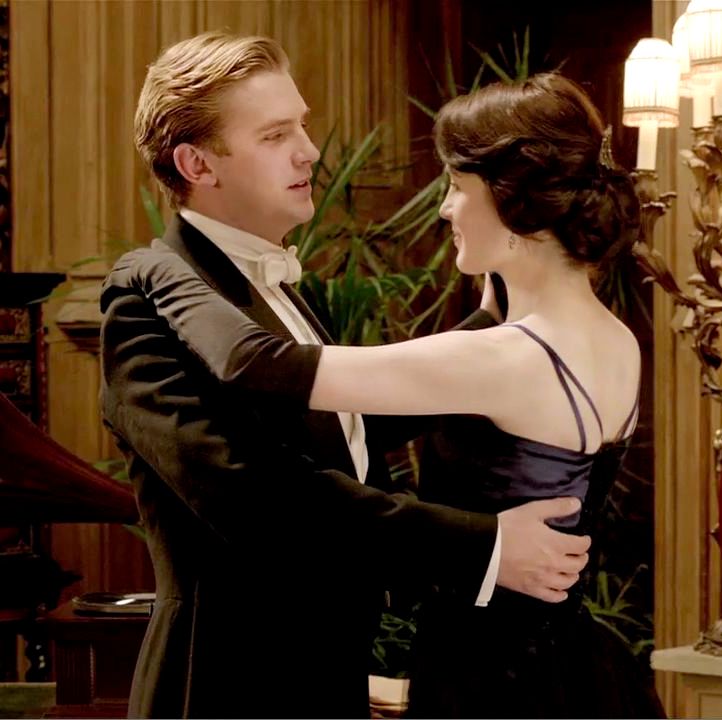
Matthew’s Moral Superiority keeps on popping up, and I find it interesting that the first time he’s really like, “You know what, I love you anyway” is in response to Mary confessing she’s not so Morally Superior herself. You see that moment of struggle when she confesses a truth she had been hiding from him, including him asking for clarification (“Did you love him?”), but then even when she admits that there was no Moral Superiority whatsoever in her actions (“It was lust, Matthew!”), he says, “I never could despise you.” (Also, a moment of appreciation for Matthew’s face when Mary says, “It was LUST!!!” because he was totally like, “But we’re English?”) It’s just very well-done thematically—and makes me really happy inside.
The Awful Truth (1937)
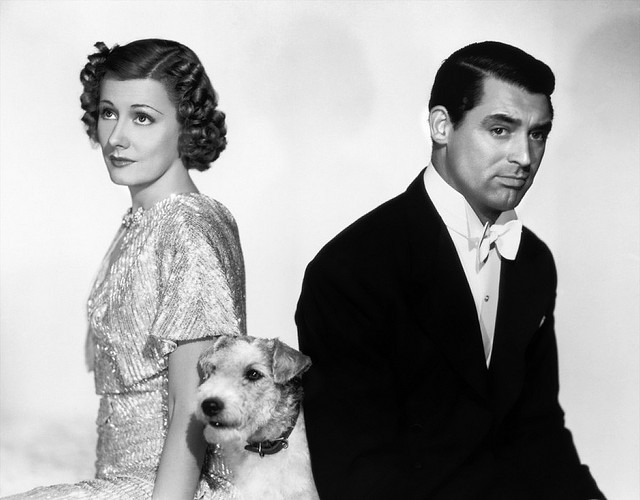 This one is pretty hilarious. Essentially, a couple decides to divorce after a number of shenanigans on both of their parts. Unfortunately, both of them realize that the awful truth is … they are still in love, despite their difficulties. However, they are both too prideful to admit it. More shenanigans ensue but fortunately, they end up together in the end.
This one is pretty hilarious. Essentially, a couple decides to divorce after a number of shenanigans on both of their parts. Unfortunately, both of them realize that the awful truth is … they are still in love, despite their difficulties. However, they are both too prideful to admit it. More shenanigans ensue but fortunately, they end up together in the end.
This one doesn’t really work UNLESS it’s a comedy. Because it’s a comedy, however, you really want these “awful” (pun intended) people to end up together because clearly they both need to be awful TOGETHER and grow up some.
I Love You Again (1940)
Same principle as The Awful Truth, but in this one, the guy gets amnesia and forgets his entire marriage—including the fact that he became an awful bore before he wooed his wife, who is now leaving him. Now, feeling like his younger (and arguably more interesting) self, who was a con man, he tries to scam her out of his own money before he leaves forever … but ends up falling in love and winning her back.
It’s cute because HE’S falling in love with her for the first time and SHE’S falling in love with this apparently more romantic side of him that’s coming out JUST FOR HER, and it’s … adorable. Goofy, but adorable.
Honestly, what I’m gathering from these is that second-chance romance works better in comedy (or when given the weight it deserves), which is a missing point in most of the novels I’ve seen for sale. Y’all pay attention, okay?
The Philadelphia Story (1940) and High Society (1956)
These two are some of my favorite old movies which are pretty much the same only the second is a musical. The heroine is inherently unlikable, but that’s some of the fun of it. Despite the fact that in both versions, she’s subject to some period-era sexism, you know that the guy who really wants her with treat her well in the end. And she needs to get back with him and give up her pride to do so. Further, these are just fun movies (or I think so—I’ve heard the opposite, too).


Why do people write this trope?
It’s time to break down the emotional logistics.
As with any trope, there are a lot of silly or shallow books written. This trope is often misused and seems to have less variety in it than others of their ilk. That said, we’re not talking about the dozens of silly, petty second-chance romances on the market. We’re talking about writing this trope, which is really just a type of relationship, in a realistic, heart-rending, and interesting way.
Here are a few of that
Let’s start with the negative ones.
Negative Desires in Second-Chance Romance Readers
We want to be pined after—and sometimes we enjoy pining.
Oftentimes second-chance romances feature one or both of the main characters pining after the other. We all relate to that, somehow. Our hearts squeeze at the thought of having our hearts broken—we don’t want it to happen to us. We don’t want it to happen to our characters either.
And we want to believe that maybe, just maybe, we are still loved even after whatever it was that drove us apart from our loved one.
Really, this is not a truly romantic thing. True romance involves love, and it is not loving to hold onto someone long after they’re gone. True love sometimes involves letting go and moving on.
We want what we wait for more than what we have.
This is why so many TV shows pull a lot of their plotlines from those “will they, won’t they” plotlines. We are looking for those secret glances. And though we want the satisfaction of the ending, the grass is always greener—so once the plot thread concludes, so does the story.
Though TV show producers want to drag that on as much as possible, authors often don’t, and readers love getting a taste of those feelings without having to go through seven trashy seasons of a TV show they’re only into for one will-they-won’t-they couple.
We have an inherent desire to return to what was.
All romance does have a degree of wishful thinking, and second-chance romance is a leader in said wishful thinking. As with the other two, readers and watchers of this trope sometimes look back at their own failed romances and nostalgically wonder what might have been. (Though I’m married to a man I wouldn’t give up for anything, sometimes I do wonder about past flirtations, of which I had a few. What would THAT life have been like? It’s a question no human can fail to ask.)
Though a lot of this can be said to feed humanity’s negative desires (after all, at the end of the day, it is more fulfilling to NOT have years of heartache, despite how it tends to be romanticized by this trope and others), we can pull great beauty out of this trope, too, if we use our healthy minds to draw healthy conclusions.
Let’s talk about the positive.
Positive Desires in Second-Chance Romance
We know that realistic romance MUST include forgiveness.
Human beings sin. We mess up. We do and say and think stupid things. And because romance is a relationship, not a genre (see what I did there, Grace?), we know that romances must include mistakes—and forgiveness of said mistakes once the inevitable apology comes around.
A lot of second-chance romances feature a forgiveness plot, and honestly, I like them. There’s a great need for forgiveness in my life and relationships—and it is precious to see the accurately and gracefully reflected in fiction.
We desire for all relationships to be resolved.
“If it is possible, as much as depends upon you, live peaceably with all men.”
God didn’t just write that in the Bible for kicks and giggles. Though sometimes it is important to move on, to break away from what is unhealthy or perverted, sometimes it is better to STAY.
In a world where divorce is rampant and a large percentage of engagements are broken off before the couple even gets to say “I do,” some romance author somewhere said, “This couple comes back together, despite it all—and they stay.” And that is powerful.
Stay in the marriage. Stay in the relationship. Stay because of love—stay in spite of a lack of love. And allow God’s grace to carry you through.
Now, I don’t want to romanticize staying in abusive, unhealthy relationships. However, do I want to romanticize staying (or coming back to) relationships with broken people who are trying their utmost to follow Christ? Yes. Absolutely. Because just staying is romantic sometimes.
To quote Taylor Swift, because why shouldn’t I do whatever I want, “Don’t read the last page, but I stay …” (That line always breaks my heart a little in a good way.)
We want to be given that second chance.
“Forgive, and you will be forgiven.”
Jesus Christ gave us that second chance—and we know we didn’t deserve it, but He did. How much more should we then reflect this in our own stories?
“But if you do not forgive others their trespasses, neither will your Father forgive your trespasses.”
Honestly, we don’t deserve second chances, but we’re always offered them—and as we know, Christ values our dedication to forgiving those that hurt us.
“If we confess our sins, He is faithful and just to forgive us our sins and to cleanse us from all unrighteousness.”

Conclusion
Second-chance romance is a trope that gets a little less attention than others. As you can see, it’s not inherently toxic, but it can get a little old. It requires some creativity to make this work, and in the romance genre, you are almost rewarded by readers for not seeking creativity.
That said, I challenge you to give this trope a “second” look! It has worth—it just has to be done in a specific way. Further, it has so much potential to dig into themes that we don’t often explore in romance. I wish, for instance, that people would write second-chance romances where characters get together after a long separation DESPITE not loving each other—because they know it’s the right thing to do. (Spoilers, but see The Lady of the Vineyard, for instance.)

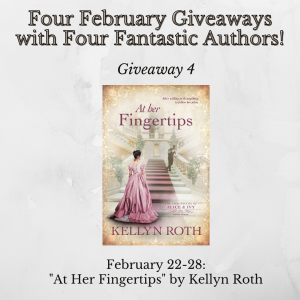 Before You Go:
Before You Go:
I have a giveaway running! I’m giving away a paperback copy of At Her Fingertips this month to celebrate Valentine’s Day.
You can enter the giveaway here:
ENTER THE GIVEAWAY
Honestly, though this book ISN’T exactly a second-chance romance, it has elements of the secondary variation of the trope (finding love after losing love), and overall, it feels like a second-chance romance somehow. Maybe it’s just my main couple’s vibe (in book 5, too).
Anyways, enter soon, because it’s only running a week!
TTFN!
~Kell~
P.S.
Are you a fan of this trope? Why or why not? (I know a lot of people who aren’t, so you won’t surprise me!) Do you see potential in this trope?

Are you interested in getting to know me & my books better?
I want to invite you to my super secret club. I mean, it’s not really a secret, because I’m telling you about it now, but here goes.
Join Mrs. Roth’s Society Column, my street team! We’d love to have you along for the ride!

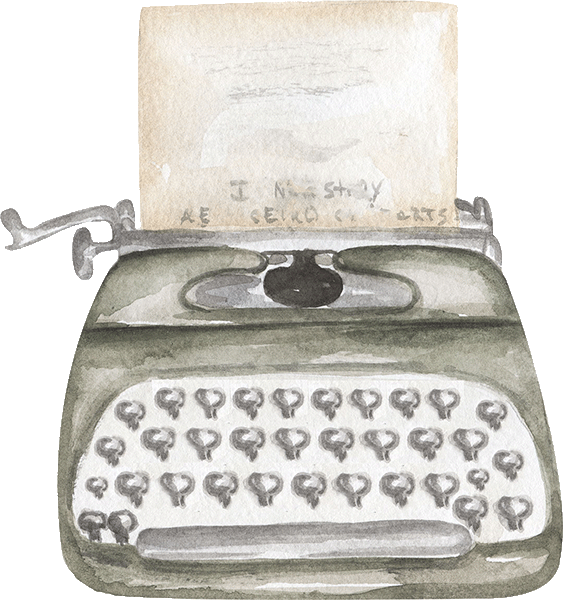
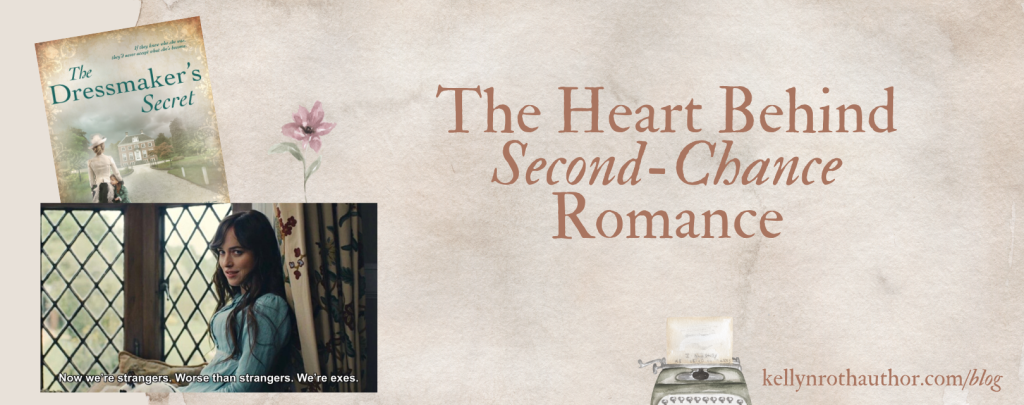
10 Responses
You wrote this just to convince me that second chance romance deserves a second chance, didn’t you, Kell? Like, seriously. I’m one of those readers who gets bored with SC (mainly because, like friends-to-lovers, 80% of modern SC romances are exactly. the. same), but when you really look at, as you phrase it, the heart behind the trope, I absolutely adore the values behind it. So maybe I just need to take it upon myself to write my own second chance romance. XD
(Plus, I’m a huge sucker for repaired marriages. The typical ex-boyfriend/girlfriend or fiance trope just doesn’t hit the same.)
(And, yes, I saw what you did there. 😉👏😂)
ALSO.
This, Kell. This.
:In a world where divorce is rampant and a large percentage of engagements are broken off before the couple even gets to say ‘I do,’ some romance author somewhere said, ‘This couple comes back together, despite it all—and they stay.’ And that is powerful.
“Stay in the marriage. Stay in the relationship. Stay because of love—stay in spite of a lack of love. And allow God’s grace to carry you through.”
I GOT FLIPPIN’ CHILLS, KELL. CHILLS.
Well, that’s exactly my point! If we take the tropes and find out what the hearts are behind them, most of them are worth writing … and then it also informs us as to what we probably SHOULDN’T take from the trope, too! I’d love to see what your take on this trope would be. (Obviously, I kind of go to the secret baby/unwanted baby route a lot. Whoops. At least that’s not the case in the one I’m outlining.)
(I also love repaired marriages! Honestly, half the time if I see that trope, I will pick up the book and give a chance. 😛 Just because I don’t see it often enough!)
Anyways, thank you!!!
Fascinating post as always, Kell! Second-chance romance is one of those tropes I don’t GENERALLY like… except when I LOVE it 😉 Which describes my attitude toward a lot of romance tropes, now I come to think of it, haha!
But yep, “Persuasion” truly is the cream of the crop. My favorite Austen novel. I could rave about it all day. Also YES THANK YOU FOR POINTING OUT that Anne Elliot is a flawed character!!! I feel like too many Austen fans still don’t recognize that–for them, Anne is the ideal heroine who “never did anything wrong in her life, ever” (thank you, Parks & Rec…) and I’m like, “no, you don’t understand, she made a mistake.” She was afraid to stand up for herself, afraid to make her own decisions, and she couldn’t find happiness until she learned that lesson.
Honestly, I have mixed feelings about most tropes, too. If it’s done well, sure. Otherwise … no. There’s no one trope I universally like (though there are some that are good signs and some that weigh against the book sometimes).
YES! 100%! Anne Elliot is such an interesting character because I feel like she’s pretty sympathetic, and probably a lot of us introverted bookish folks (many of which are naturally people-pleasers in one way or another) are like, “Oh, the baby!!!” And I’m like, “No, the adult woman who messed up and is learning to do better.” Like, granted, I see how it’s easy to view her as the victim, but she was a victim in the sense that she was bullied (ish, by somehow who would probably have loved her anyways) into legitimately breaking the heart of another human being who she loved, and further, being a people-pleaser is not a good thing in the long run … so ignoring that message is contrary to the intention of the novel, and perhaps even Austen’s reflections about her life. It kind of throws dirt in all she probably processed and learned herself (potentially – God only knows, of course).
Yep, that’s me! I always start out every romance with a good deal of skepticism–like “you have to convince me, book.” But I’m open to being convinced by a lot of different tropes as long as they’re well done.
“OH, THE BABY”
Yes XD XD Anne was a victim of Lady Russell’s bad judgment and bad influence, it’s true, but she chose to listen to Lady Russell and be guided by her instead of by her own conscience. And the real kicker is, even eight years later at age twenty-seven, Anne is STILL struggling with the need to please Lady Russell, to the point where she admits to herself she might actually have accepted Mr. Elliot at Lady Russell’s urging. Which, as we all know, would have been a disaster. Anne desperately needs to learn to rely on her own judgment instead of others’… and she eventually does! Hence the happily ever after <3
But yeah, if you ignore that in favor of praising Anne as perfect, then you're ignoring her whole character arc and the crucial lessons Austen is trying to teach.
Yeah, I usually have to be convinced with anything tropey. There are some things I accept – but they are few and far-in between.
YES! Like, 27 is old enough to know your own mind. And I wouldn’t go as far as to say, based on the content of the books, that Anne is a victim of legitimate abuse (well, at least not from Lady Russell – you could argue about her family, but Lady Russell is just giving ADVICE and Anne is just pleasing her because she wants to). Maybe you could argue it the other way, but based on the ease with which she extracts herself, it operates as a basic character arc without an escape from past abuse, so I just don’t understand the take that “Anne is perfect!!” take.
That’s really interesting you bring that up, because I hadn’t actually heard the “Lady Russell is abusive” take before. In my own experience, people presenting Anne as flawless and her behavior as ideal tend to EXCUSE Lady Russell as much as possible (she was just giving the best advice she could, therefore Anne was perfectly correct to listen to her, obedience is prized above all else, etc. etc. etc.)
My take is that Lady Russell is overly controlling and lowkey toxic–although not irredeemably so–but not outright abusive–AND that she gives terrible advice, WHICH Anne chooses to listen to because she’s a people pleaser who doesn’t trust her own judgment. So for me, Anne’s character arc is about disentangling her own judgment from Lady Russell’s overbearingness (is that a word??? doesn’t matter, I’m using it) and learning to make her own decisions as a mature adult. Only then can she find happiness with Wentworth. I agree with you–that’s your ordinary, garden variety character arc where the protagonist’s biggest enemy is her own flaws. Which is why it’s so satisfying when she overcomes them <3
I’ve only heard it once or twice while excusing Anne’s behavior – sort of a last-minute cop-out, like, “Well, you can’t blame her because she was the subject of abuse!” And I always think, “Abuse is a lot more serious than that …” I agree that she’s lowkey toxic but not outright abusive or irredeemable. She’s manipulating Anne, yeah, but Anne is SO easy to manipulate, and that’s … the whole point. It’s about a negative personality trait, not a serious past trauma.
Precisely, Jeeves. You put it all in a nutshell.